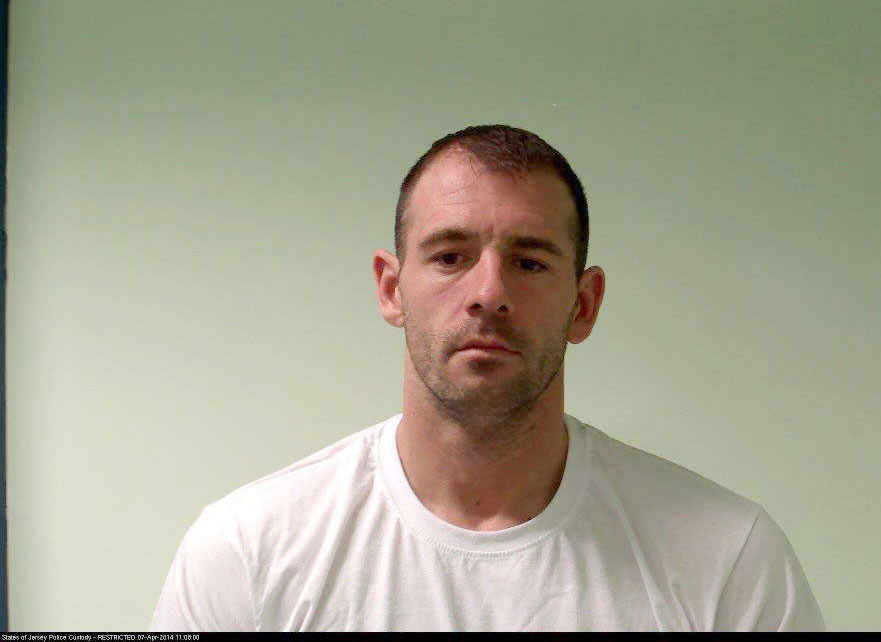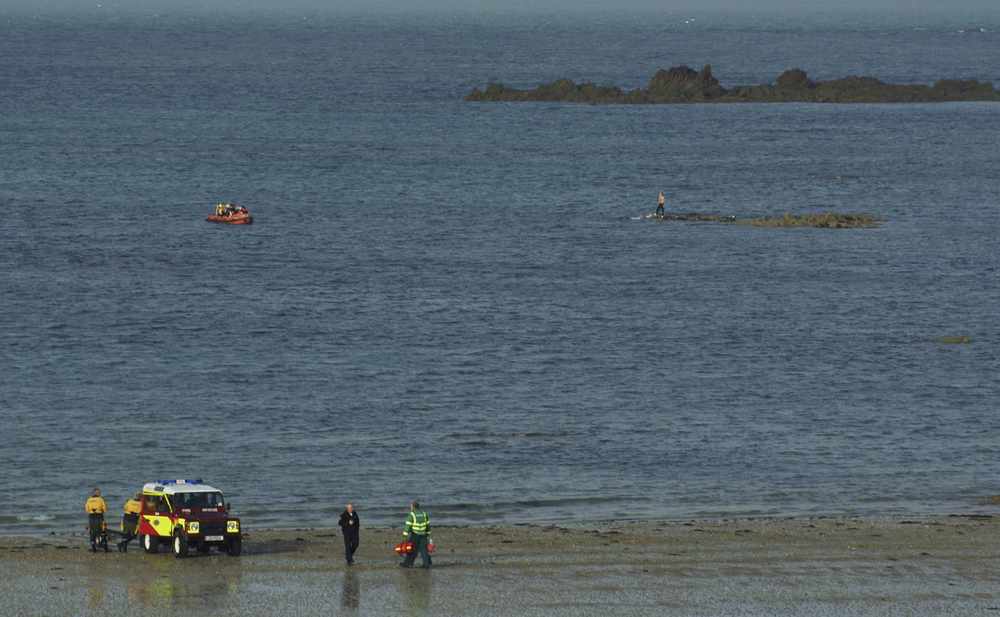Darren McCormick murdered 46-year-old Colin Chevalier with an axe in April last year and was arrested by armed officers the following day with his victim’s ear in his pocket.
He later pleaded guilty to murder.
Earlier this year, McCormick was sentenced to life with a minimum of 25 years before he can be considered for parole.
His lawyer, Advocate Julian Gollop, claims that the sentence is too high.
Dressed in a black polo shirt and flanked by two police officers during the Court of Appeal hearing in the Magistrate’s Court yesterday, McCormick – who nearly killed a man in a similar attack 13 years ago – watched on as Advocate Gollop outlined the case for the appeal.
The advocate argued that in delivering the original sentence, the court had not been clear as to the weighting of certain mitigating factors.
He said: ‘My submission is that there were mitigating factors that the court must take into account.
‘We are starting with a 30-year starting point with the additional factor of the mutilation.
‘Is it to say that that aggravating factor outweighs all the mitigating factors?
‘It is important for the defendant to know that where he has mitigation, where he has a guilty plea, it is important for the defendant to know that that has been given proper weight.’
Advocate Gollop made reference to other cases in the UK where there had been clearer sentencing guidelines.
‘He does not know how that figure has been made up.
‘It needs to be sufficient for the defendant to understand what credit has been given and taken into account.’
Advocate Howard Sharp, representing the Crown, said: ‘I will invite the court to take a step back and decide whether the sentence was manifestly excessive.’
He added that he did not believe that a starting point of 25 years, given the aggravating factors of the defenceless victim and the sustained violence of the attack, was excessive.
‘When one acknowledges the full aggravating factors, we will end up with a figure of around 25 years.
‘It tends to show that the court was in the right area, or certainly that it was not manifestly excessive.’
The Court of Appeal is due to deliver its decision on Friday.
A VIOLENT criminal has been jailed for life for killing and mutilating a drug dealer in a town flat while high on one of the most dangerous former legal highs ever seen in Jersey.
Darren McCormick – a career criminal with a history of violence and drugs offences – repeatedly hacked at Colin Chevalier with the victim’s own axe as he lay helpless on his bed.
And after killing the 46-year-old almost instantly with blows that left a ‘trench-like gash’ in his face and massive wounds to his head and neck, McCormick set about mutilating the corpse with the axe and a Stanley knife.
The horrific acts included slicing off his victim’s right ear, making a ‘sustained attempt’ to cut off his right hand and possibly attempting to decapitate him.
McCormick – who was high on a cocktail of alcohol and drugs, including the dangerous party drug ethylphenidate – also scrawled ‘If there is no f***. Why can’t I be normal. All liars’ on the bedroom wall using his victim’s blood. A bloodied hand print was also found next to the writing.
McCormick was arrested the following day on rocks on the beach at St Clement – still with Mr Chevalier’s ear in his pocket.
The 36-year-old – who nearly killed a man in a similar attack 13 years ago – later pleaded guilty to murder and was yesterday jailed for life by the Superior Number of the Royal Court and told he must serve a minimum of 25 years before he can apply for parole.

He refused to stand when Bailiff Sir Michael Birt delivered the sentence, and instead sat head bowed in the dock.
Outlining the case, Solicitor General Howard Sharp told how McCormick killed Mr Chevalier – a small-time drug dealer – at the victim’s flat in Duhamel Place on 5 April after a five-day drink and drugs binge.
The court heard how, shortly before the murder, the defendant bought ethylphenidate – known on the streets as crystals or magic crystals – from Mr Chevalier, who was in the property with two other people. An hour and a half later the pair were alone in the flat together.
Describing the attack, Mr Sharp told the court how McCormick took an axe belonging to Mr Chevalier, a father and step-father who worked as a carpenter, before pouncing on him as he lay, possibly asleep, in his bed.
McCormick then butchered his victim – inflicting 41 wounds – before phoning a friend and saying: ‘I’ve done something wrong. He’s been lying to me all night. I have cut his head off.’
About two hours later – with McCormick still at the flat and covered in his victim’s blood – two men and a woman entered the property looking to buy drugs. The court heard how McCormick, a father-of-one, confessed to the killing and showed them the mutilated body before one of the four rifled through the dead man’s wallet.
Mr Sharp, who called for the court to set a minimum tariff of 32 years, said that at some point later ‘it was likely’ that McCormick was taken from the property by his partner – who he had spoken to on the phone from the murder scene earlier in the night.
Mr Chevalier’s body was found by armed police after they smashed their way into his property following a tip-off and MCormick was arrested the following morning on a rock in shallow water in St Clement.
During police interview, McCormick immediately confessed to the killing, telling officers: ‘I went berserk. There was blood everywhere.’
But he claimed he did not know why he committed the act.
Advocate Julian Gollop, defending, admitted that the offence was a ‘brutal and savage killing’ but said that the minimum tariff being called for by the Crown was excessive.
The court heard how McCormick suffered a serious brain condition in 2011 which required emergency surgery and has since developed epilepsy. He also suffers from an antisocial personality disorder.
Addressing the court, Advocate Gollop said that the mental disability was a mitigating factor and stressed that his client was remorseful, had confessed to the police at the start of the first interview and had offered a guilty plea at the earliest opportunity.
The Advocate added that the attack was not premeditated and that his client could still not explain why he had committed the murder. He said that McCormick, who will be 61 before he can apply for parole, had been trying to turn his life around when he suddenly embarked on the five-day drink and drugs ‘bender’.
Delivering the court’s sentence, Bailiff Sir Michael Birt said that it had been a ‘brutal murder’ which had ‘devastated the victim’s family’.
He said: ‘The evidence shows he was lying in his bed. He was offering no threat to the defendant yet the defendant attacked him in an appallingly violent manner.
‘The reason for the murder is unknown but the background is that Mr Chevalier had supplied the defendant and others controlled drugs and at the time the defendant had taken a cocktail of alcohol and drugs.’
McCormick is detained at La Moye but is due to be transferred to a Category A prison in the UK.
Jurats Jill Clapham, Geoffrey Fisher, Robert Kerley, Suzanne Marett-Crosby, Paul Nicolle, Sylvia Milner, Anthony Olsen, Michael Liston, Charles Blampied, Geoffrey Grime and Jeremy Ramsden were sitting on the case.

DARREN McCormick confessed to the killing in his first police interview, telling officers: ‘I went berserk – there was blood everywhere.’
Following the formal introductions during the interview at police headquarters on 7 April, the 36-year-old immediately admitted responsibility for the killing, but claimed he could remember little about the attack.
‘You’re going to ask me lots of questions,’ he told officers.
‘I’m not going to be able to answer them all. It’s a blur. I do believe I killed Colin.’
McCormick continued: ‘I believe I killed him. There’s not a lot I remember. In fact, I know I killed him. That’s what I do remember.’
Asked for details, he said: ‘I recall being insulted a number of times. I can’t recall what the insults were.’
The Royal Court heard that McCormick went on to claim that he had ‘problems/thoughts in his head and that he had been fighting them’.
Solicitor General Howard Sharp said that the killer described how he had undergone treatment for a brain condition and that he claimed that he had recently sought treatment from St Saviour’s Hospital.
‘He repeated he was not well and suggested that if he was returned to prison he would kill someone there. The defendant questioned if he was normal,’ he said.
McCormick was later charged and indicted in the Royal Court on 9 April. He appeared in court again in June and September before pleading guilty to murder in a hearing on 14 October.

THE moment Darren McCormick was confronted by police after being spotted on a rock in the sea at St Clement was captured by a photographer on the shore.
The 36-year-old – who was half naked and brandishing a knife – gave himself up after being talked off the rock by trained police negotiators on board the Fire and Rescue Service’s inshore rescue boat. Following the arrest, which was witnessed by home owners and morning dog-walkers, MCormick was brought back to shore and taken to hospital.
Describing the operation, Rupert Goldie, a 45-year-old IT worker who witnessed the build-up to the arrest from his seafront apartment, said: ‘I could see there were a lot of police out on the beach and that they were looking around.
‘Then I saw this guy on a rock. At first I thought it was a guy who maybe had had too much to drink and wandered out and got caught out by the tide.
‘I got my camera and I saw it looked like he had something shiny in his hand.’
The father of one added: ‘The police went out on a boat – I couldn’t see whether they were armed – and there was a stand-off. I couldn’t hear what was being said but there was some gesticulating.’






